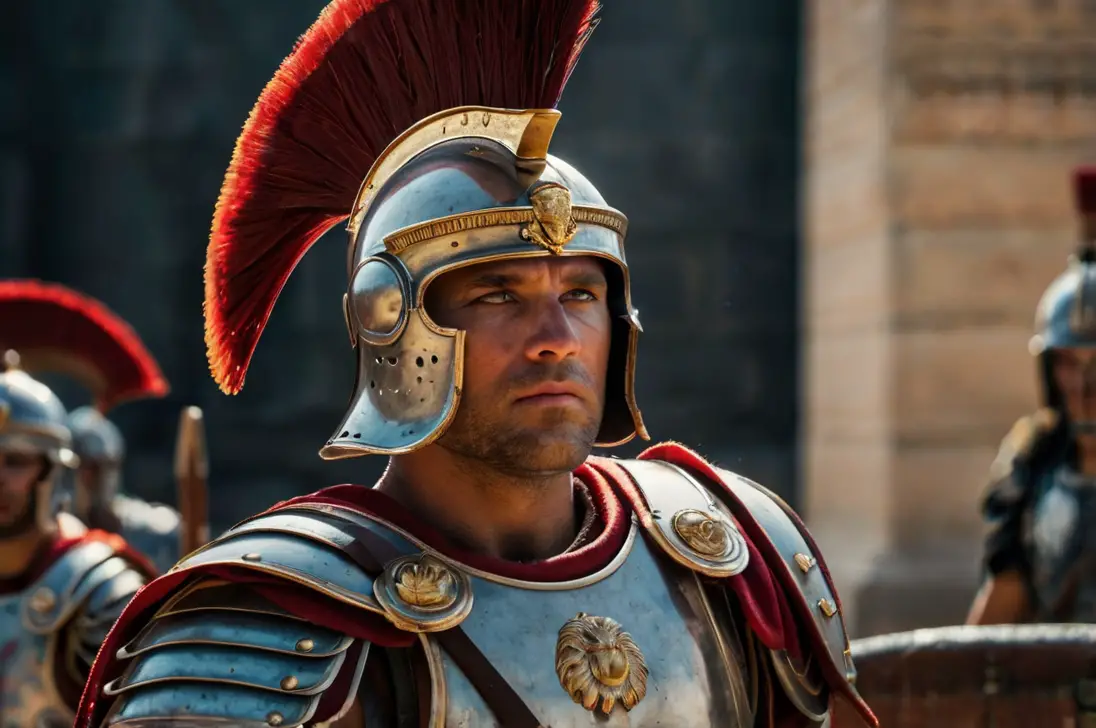
The life of a Roman soldier was one of discipline, duty, and dedication.
These warriors of ancient Rome were not only trained for battle but also for survival and adaptation in various environments.
From rigorous training routines to their personal lives, Roman soldiers had a unique and structured daily existence.
This blog post will delve into the daily life of a Roman soldier, covering their training, battle preparations, personal lives, and health practices.
By understanding these aspects, we can appreciate the resilience and commitment of these ancient warriors.
The Daily Life of a Roman Soldier
Training and Duty

- Read also: A Historical Overview: The Rise and Fall of the Roman Empire
- Read also: The Pillars of Rome: A Look at the 10 Best Roman Emperors
Basic Training
Roman soldiers underwent extensive training to prepare for the demands of battle.
This training was designed to develop physical strength, endurance, and combat skills.
- Physical conditioning: Soldiers engaged in activities such as running, marching, and weight lifting.
- Martial arts: Combat training included practicing with wooden swords, spears, and shields. Soldiers would spar with each other to hone their skills in a controlled environment.
- Tactical exercises: Soldiers learned various tactical maneuvers, formations, and battlefield strategies.
Battle preparation
Before heading into battle, Roman soldiers had a series of preparations to ensure they were ready for combat.
- Sharpening weapons: Soldiers would meticulously sharpen their swords, spears, and other weapons to ensure they were effective in battle.
- Checking armor: Ensuring that their armor was in good condition was crucial for protection. Any repairs needed would be done before marching out.
- Rituals: Soldiers often performed rituals and prayers to seek protection and favor from the gods. These rituals helped boost morale and instill a sense of divine support.
Battle tactics
Roman soldiers were known for their disciplined and strategic approach to warfare.
Their training included learning and practicing various battle tactics.
- Testudo formation: In this formation, soldiers would align their shields to create a nearly impenetrable barrier. This was particularly useful for protecting against arrows and other projectiles.
- Cohort tactics: Soldiers were divided into cohorts, each with specific roles and formations designed to maximize their effectiveness in battle.
- Flexible strategies: The Roman army adapted their tactics based on the enemy they were facing, making them a formidable force in various combat scenarios.
Personal Life

Family and relationships
Roman soldiers often spent long periods away from their families.
Despite the distance, they maintained relationships through letters and occasional visits.
- Letters: Writing letters was a common way for soldiers to stay in touch with their loved ones. These letters provided emotional support and updates on personal affairs.
- Visits: When possible, soldiers would visit their families during leaves or after campaigns. These visits were cherished moments of reunion and respite from military duties.
Food and drink
The diet of a Roman soldier was simple yet nourishing, designed to sustain them during their demanding routines.
- Rations: Soldiers were provided with basic rations that included bread, cheese, and wine. These staples formed the bulk of their diet.
- Hunting and foraging: When on campaign, soldiers would hunt and forage to supplement their rations. This not only provided variety but also ensured a steady food supply.
Leisure activities
Despite their rigorous schedule, Roman soldiers found time for leisure activities to relax and bond with their comrades.
- Games: Soldiers played various games, such as dice and board games, to pass the time and entertain themselves.
- Reading: Literacy was valued, and many soldiers would read during their downtime, often sharing books and scrolls.
- Music: Playing and listening to music was a common pastime, providing a way to unwind and enjoy some creative expression.
Health and Hygiene
Health Risks
Roman soldiers faced numerous health risks, including diseases, injuries, and exposure to harsh environments.
- Diseases: Living in close quarters and moving through different regions exposed soldiers to various diseases. Epidemics could sweep through camps, affecting many.
- Injuries: Combat injuries were common, and soldiers had to be adept at first aid and basic medical treatments.
- Harsh environments: Soldiers often endured extreme weather conditions, from scorching heat to freezing cold, which could take a toll on their health.
Hygiene practices
Maintaining hygiene was crucial to prevent disease and maintain overall health.
- Washing: Soldiers practiced basic hygiene by washing their hands and faces regularly. Bathing was less frequent but still an important ritual.
- Latrines: Camps were equipped with latrines to manage waste and prevent contamination of living areas.
- Sanitation: Cleanliness in the camp was enforced, with designated areas for cooking, eating, and waste disposal to minimize health risks.

- Read also: Unveiling the Legendary Heroes of the Arena: Famous Roman Gladiators
- Read also: Unearthing the Past: A Glimpse into Ancient Roman Artifacts
Conclusion
The daily life of a Roman soldier was marked by discipline, rigorous training, and a strong sense of duty.
From physical conditioning and tactical exercises to maintaining relationships and engaging in leisure activities, these soldiers balanced their demanding military roles with personal lives.
Understanding their routines and practices gives us a deeper appreciation of the resilience and dedication of these ancient warriors.
Their commitment to maintaining health and hygiene, despite numerous challenges, highlights the importance of preparation and adaptability in any aspect of life.



